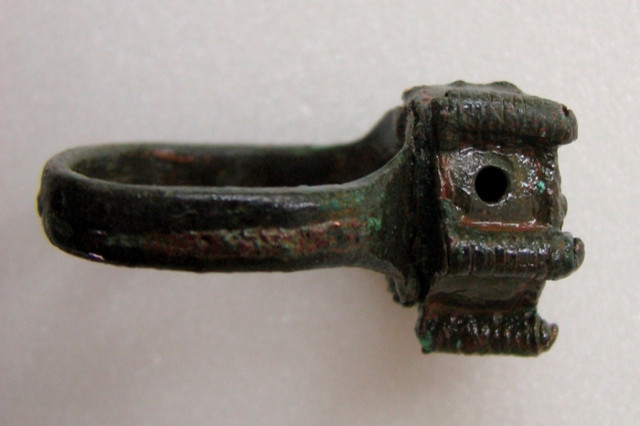Archaeologist Find Medieval Poison Ring Likely Used In Political Murders

Archeologist in Bulgaria have uncovered a medieval bronze ring that is believed to have possibly been used for political murders.
The deadly accessory was found at the site of a former medieval fortress in Cape Kaliakra, reports Discovery News. The location is close to the Black Sea town of Kavarna, located in northeast Bulgaria.
According to local authorities, the artifact was likely worn by a male on the smallest finger of the right hand. The fascinating ring includes a hollow, round cartridge in its bezel, ideal for hiding posionous substances, Euro News reports.
“The cartridge was adapted into the ring for the poison to be poured into a glass quite seamlessly,” said the Kavarna municipality in a statement.
Bonnie Petrunova, head of the dig and deputy director of the National Archeology Institute and Museum in Sofia, says the intriguing piece definitely appears to have had a specific purpose.
“I have no doubts that the hole is there on purpose and the ring was worn on the right hand, because the hole was made in such a way so as to be covered by a finger, so that the poison can be dropped at a moment’s notice. Clearly, it was not worn constantly and would have been put on when necessary,” Petrunova said.
Poison was regularly used in political murders during those times and the ring just may have played an important part during a period that Kaliakra was the capital of a principality in the Dobruja region.
Dobrotitsa, who ruled the independent Despotate of Dobrudja, and his son, Ivanko Terter, were locked in a major conflict during the second half of the 14th century, and the ring was possibly used in that fight, according to Petrunova. He believes that the discovery of the ring points to one of the possible unknown tools used in numerous serial murders during that period.
“It would solve many of the unexplained deaths among nobles and aristocrats close to Dobrotitsa,” Petrunova said.
© Copyright IBTimes 2024. All rights reserved.






















